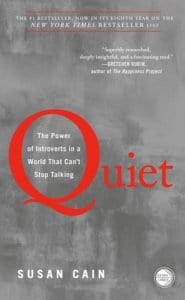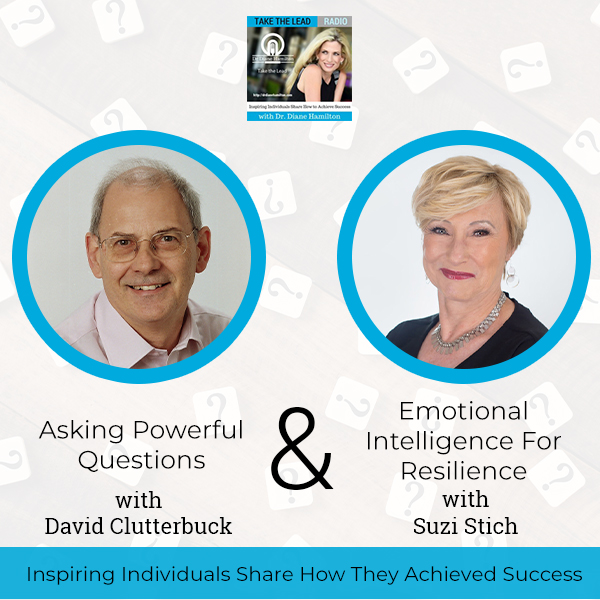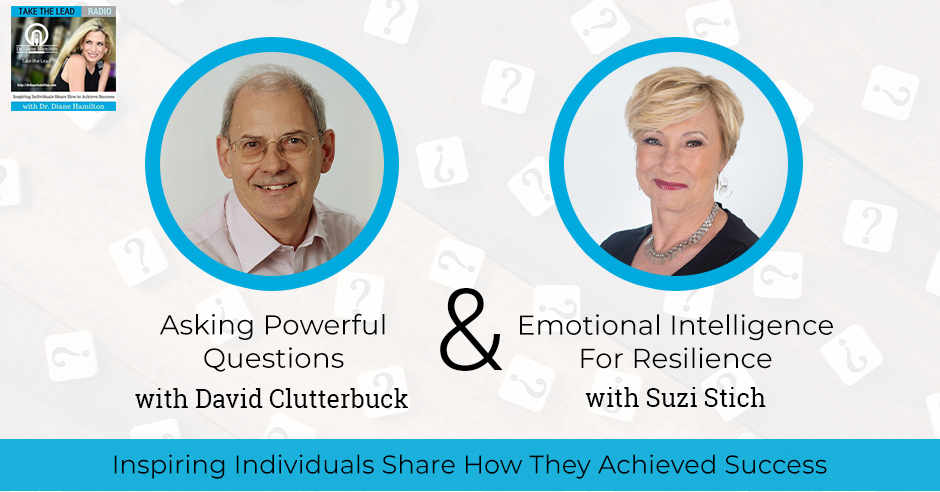Developing curiosity and asking questions are powerful, especially in changing times or in a crisis. Today, Dr. Diane Hamilton interviews David Clutterbuck, a prolific author and renowned expert in the area of coaching and mentoring. The Co-founder of the European Mentoring & Coaching Council, he is a master of asking the hard questions. He discusses the four reasons why people ask questions and shares how healthy communication in the work environment can bring about productivity. David also shares his knowledge of how curiosity using technology and your emotional intelligence can help develop empathy and help discover true life passions.
Also in this episode is Suzi Stich, a Public Speaker, Trainer, and Human Resource Professional who has developed the twelve-step process for resilience. Her background and experiences allowed her to create new approaches to dealing with complex people issues that require resilience, emotional intelligence, and greater problem-solving skills. Her aim is to teach the younger generation and business professionals to help them differentiate emotional education from emotional intelligence. Suzi hopes to educate others to help them deal with their situations in a more positive outlook.
I’m glad you joined us because we have David Clutterbuck and Suzi Stich here. David is a prolific author and renowned expert in the area of coaching and mentoring. Suzi is a speaker, CEO, and Founder of Suzi Stich LLC. She deals with not just emotional intelligence and resilience but emotional education, which is going to be interesting to talk about. We’re going to get into a lot of mentoring, coaching, leadership, and more.
Watch the episode here
Listen to the podcast here
Asking Powerful Questions With David Clutterbuck
I am with David Clutterbuck, who is one of the early pioneers of development coaching, mentoring and the Cofounder of the European Mentoring & Coaching Council. He’s the author of more than 70 books and he works with evidence-based coaching cultures and team coaching. It’s such an honor to have you. Thank you for being here, David.
I’m pleased to be here.
That’s quite a few books. I was looking at a lot of them and I was watching some of your videos. I’m interested in the work you’ve done. Before we get into that, I want to get a background on you. How did you get to this level of success just for those who don’t know your background?
I had some brilliant mentors all the way from school through the early parts of my career. I’ve always sought out mentors. I was lucky enough to be mentored a little bit by the great Peter Drucker, whose career I followed. He was originally a journalist, so was I. All through my career, I’ve had wonderful mentors. Even when I decided that I wanted to write children’s books, I made contact with the amazing comedian, Spike Milligan. He was helpful in writing to me and giving me guidance, advice and encouragement. Mentoring has been a large part of my life. It’s also been part of a long journey of helping people wherever they are and have the conversations that they need to have in order to fulfill their ambitions.
That’s a big order. I work as an MBA program chair and some other things. I’ve worked with a lot of students who have challenges with the conversation, communication and soft skills parts. I know you touch on all of those.
MBA stands for More Boring Academics.
I’m with you on that one.
PhD stands for Piled High with Debt.
That’s also true. I love those. You’re a professor. What are the main things that you’ve taught? What was your main focus as a professor?
Everything has been around this whole area of conversations over the last 40 years. I did a lot of work in employee communications. I developed a lot of theory and good practice there. It took me into mentoring. By mentoring, I mean mentoring in its original or pure form, not what’s often seen in the States which is an amalgam of mentoring and sponsorship that doesn’t work that well. Mentoring led to coaching because mentors are coaches plus. They have all the skills of a coach plus the knowledge and the ability to ask powerful questions because they have some knowledge of the other person as well.
I love the idea of asking powerful questions. I want to get into what you were talking about in one of your videos about how we were different from the Neanderthal. Do you think that curiosity is important for developing tools and technology? How do we develop that in people?
This curiosity gene is built into everybody. It is one of the distinguishing factors of our species. What it means is that we are intrigued. We want to experiment. We want to find things out. We want to know why we’re here at the philosophical level. That’s given rise to all the great religions. It’s giving rise to science. What tends to happen often is that our school systems and our educational processes at work actually kill curiosity. We tend to create linear thinking patterns that get in the way of being curious about other ways of doing things.

Asking Powerful Questions: We tend to create linear thinking patterns that get in the way of being curious about other ways of doing things.
I was talking to somebody from a big accountancy firm. They were saying that the problem they’re having all the time is the accountants don’t want to change anything. They are afraid of change rather than them seeing it as something that’s exciting. How do we make changes for these organizations? How do we rekindle people’s curiosity, not curiosity just about things, but curiosity about each other? A lot of the work that I’ve done in diversity has been helping people become curious about how the world looks from the perspective of somebody who’s different. A lot of work I do with coaching, because we’re running a research program, is looking at diversity in coaches’ practice. Most coaches don’t have a diverse practice. They have a bunch of clients who are like them. That’s partly because of the chemistry meeting. Who’s there to challenge the way that they think? Who’s there to suggest that maybe the assumptions that they have are not the only assumptions that could be applied in a situation?
I’m trying to get coaches around the world to rise up to the challenge of saying, “At least once a month, I need to challenge a fundamental belief or assumption that I have.” That’s quite hard to do for coaches and for leaders too. That’s one of the most important things that we can do. One of the tools and techniques I give them is to get people to go and stand in the middle of a large bookstore. They close their eyes and rotate around a couple of times. It looks crazy. They point with their finger and wherever their finger is pointing, they go and read some books from that shelf. That has such an amazing impact on giving people another insight into ways of thinking about things. I ended up in an origami section once. It’s amazing how origami can be related to complex problems that we face in the workplace.
In my research for curiosity, you mentioned the curiosity gene. I know the Max Planck Institute coined that phrase. When you’re talking about how we’ve had the education and some of this stuff has been not great for curiosity. I know Sir Ken Robinson and George Land have had some great talks about that. What I found when I was studying this is, I created an assessment to determine what keeps us from being curious. There are four things and you’re hitting on a lot of these right now. It’s fear, assumptions, technology and environment. I love the assumption assignment. You walked right into my research. You talk about some of the skills that we need. I’ve had a lot of Harvard professors here. I’m thinking of some of the conversations we’ve had about collaboration and how important curiosity is for that. I liked how you were talking about how we had social skills, the ability to lie on certain things. Each generation is getting better at lying and detecting lies. You said that helps us collaborate. How does that help us collaborate?
If we are trying to put ourselves in other people’s shoes all the time to understand other people, that enables us to accommodate their needs. In the workplace, we often lose the ability to check in with other people about what they need to feel safe and secure, to feel engaged. We talk about our modern work with teams, that the high performing team, everybody has responsibility for their own and everybody else’s performance, learning, and well-being. That’s the kind of environment that enables teams to flourish and grow.
It was Amy Edmondson who did a great TED Talk. She was on my show, talking about how we were able to collaborate in a high-pressure environment. She’s done some amazing work. There’s so much we can learn from being curious and asking questions. Teams have so many issues. I’d like one of the exercises that you suggested that you’ve done with teams that I thought were fascinating. You said people have issues. They’re afraid and feel constrained to talk about things. That’s what I think is a big problem with curiosity because we’re getting into the status quo thinking. We’re afraid we’re going to say something we’re not allowed to say, propose something, somebody’s going to freak out, or whatever. You make people write down the things that they feel most constrained about and put them into a basket.
Everybody writes it down in capital letters. One issue that the team avoids talking about or that needs to be talked about, the conversation that should be had, but everybody’s afraid to have. They fold it up and put it in a basket. You circulate the basket and everybody takes one issue out. Because it’s all in capital letters, you don’t know who wrote it. We then have the responsibility to present that issue. You can’t just say, “It says here.” You’ve got to present that issue with passion as if it were your own and then you lead the discussion around that issue. What it does, it makes it safe to bring these issues out. What I find fascinating is that the more that teams get used to this kind of behavior, the more issues come out. You feel safer in digging deeper. It’s one of the many simple tools that we’ve got to ensure that people are able to speak out. There are lots of other things that we do to enable people to have a voice in meetings, for example. The introverts get drowned out often by the extroverts. People got a dissenting view to be able to say, to be able to voice and be listened to. I get tears sometimes when I ask senior people in organizations, “When did you last feel truly listened to?” The answer for most people is not a lot.
Sometimes, extroverts are so anxious to get out what they want to say that they’re not asking a lot of questions. That’s why Quiet was such a popular book. We got to see a little bit on the other side.
We have an acronym, EBFM. Engage Brain Before Mouth.
You talk about the context in which question exists is powerful. I like that discussion. What do you mean by that?
Do you mean that what makes a question powerful or do you mean the different perspectives from which we ask questions?
The types of questions we ask depend on when and how we ask it. I wasn’t sure. I was watching your video and you had talked about that. It made me think about the importance of asking questions. In the emotional intelligence aspect of developing empathy, of course, is such a huge thing. As my next research is on perception. What I found with perception is it’s a combination of IQ, EQ, cultural quotient, and curiosity quotient. Everybody’s looking at these questions from their own perception in a way, don’t you think?
Yes. It goes back to some work we’ve been doing around what motivates somebody to ask a question. The worst reason for asking a question is to put somebody else down, “Who do you think you are?” I like fun questions like, “Who do you think you are to have imposter syndrome?” We can play with a lot of these things. Asking questions for people is all about your ego. Asking questions for the purpose of getting some information, that’s what we do when we ask the way to the bus station or whatever. That’s transactional. You’re not interested in the other person or their perspective. You just want them to tell you a piece of information.
[bctt tweet=”The worst reason for asking a question is to put somebody else down. – David Clutterbuck” username=””]Asking questions for your understanding so that you can work something out in your own head, that’s one thing. The fourth one is asking questions that are curious about how the other person is making sense of the world. This is the core of great coaching. There’s a whole process that advanced coaches and mentors get into. It’s about asking a question knowing it’s not the right question, but knowing that it’s part of a sequence of questions that will arise both in your mind and in the mind of the other person. It will ultimately lead to the question that’s powerful. I think that’s a real skill to do that.
Can you give an example of doing that?
When we do coach assessment centers, we’re left with a coach that’s not good. We have to give somebody a ten-minute brief coaching session. We leave them with 2 or 3 questions that get to the heart of their issues. I recall some of this happening with a client here. They’re all real people with real issues. She had a work-life balance issue like she was all work and no life. We asked her a couple of questions and one that struck home was, “How do you reward yourself?” This fits the PRAIRIE model of questions. The question has to be personal, it’s focused on you. It’s got to be resonant, it has an emotional impact. It’s acute/incisive. It is reverberant, it keeps coming back to haunt you because you never quite fully answer it. It’s explicit, it’s simply expressed. The reverberant part is the key part.
She caught me in the corridor six weeks later and said, “That question you asked me, I’ve been thinking about it every day, multiple times a day. I haven’t answered it yet, but I will.” She did. She left a high-powered corporate job and went to work in the HR department of a major international charity. She got her life back. Those are kinds of questions that force you to think beyond the here and now. I had somebody send me an email that said, “You won’t remember me but you gave me some brief coaching at a conference fifteen years ago. I’ve been working on the questions you asked me ever since. I’ve answered one of them now and I have now changed my career entirely.” I don’t know who it was and what the question was. These powerful questions are like an itch. You can’t stop scratching them.
You’re known for asking these unusual, massively difficult questions. It’s how it says it on your website. What kind of massively difficult question can you ask me to make me rethink my life? Do you have to know more about me to ask me that?
Let me see how I could do just off this box. What’s the major contribution that you want to make to the world?
I’m interested in making people get out of status quo thinking so that they can ask more questions, be more curious, find their true passions, and not be stuck in dead ends.
It’s great that you’ve got an answer. How would that answer evolve as you evolve?
That is a massively difficult question. As I delve into one area of behavior, I start adding new areas. The perception, obviously, is my next step after curiosity. I’m known as a behavioral expert, so I keep finding new behavior. I started at emotional intelligence which led to the next thing and the next thing. Is it possible to know what the next thing is going to snowball into? That’s my question back to you.
Probably not. It’s a stage growth issue. It’s interesting to be thinking about it, speculating, and having one’s mind on it. There’s another question we ask quite a lot, which is, “Who is the person that you want to become?”
That is interesting because it’s usually a compilation of several people who you admire, I would imagine. You take parts of this person, “I’d like to be a little bit like that.” Who wouldn’t want to be part Mother Teresa, part Neil deGrasse Tyson or Einstein?
It’s the person that you want to become, being your authentic self. What do you want to achieve? It’s a different question.

Quiet
That’s a personal question for people. I think it changes each year. One of the things about being older is you see what your choices were every decade as they’ve gone by. Sometimes you think, “I spent so much time doing this, maybe I should have done that.” If you hadn’t done all those things, you wouldn’t be who you are now with all this experience from what you had. I always used to ask people, “What would you change?” Most people wouldn’t change anything. Would you change anything?
Absolutely not. I bet my screw-ups have been the most valuable things that have happened to me.
We learn the most from mistakes, don’t you think?
Yes. I have a son who has both Down Syndrome and Autism. Many people said, “That’s terrible.” I think it’s been a wonderful experience. I have learned so much.
It’s amazing the things that we think of as challenging things sometimes are the most rewarding in a different way. It takes you into a whole new direction that you had never considered. You never probably considered origami as something of a research. You mentioned the different introvert-extrovert thing. I’m curious if you’ve taken the Myers-Briggs what you are.
Yes. The trouble with Myers-Briggs is its test-retest validity is pretty low.
I know a lot of people don’t give it a lot of validity. I was curious if that was the one you were relying on for the introvert-extrovert component.
I was using it in broad terms. There have been a number of better validated and better evidenced tests that come up with similar things, so it’s just a shorthand language.
Are you more of an introvert or an extrovert?
I’m an introvert that’s learned to be an extrovert.
I think a lot of us are. We’re never one thing all the time. I’ve seen so many great talks on it. I like that you’re always trying to take on major learning challenges every year. What did you try to take on in 2020?
With the coronavirus, everything else was thrown out. There were lots of things in play. I planned to learn to do wing walking.
[bctt tweet=”The more that teams get used to a certain behavior, the more issues come out. – David Clutterbuck ” username=””]What is that?
It’s where they give you a rope and tie you on to the wings of a plane. You go for a walk on the wings of the plane.
Are you serious?
Absolutely.
How far up in the air is this plane?
It’s only a few hundred feet.
You only need to fall a few hundred feet.
It’s still a long way to go. The scariest thing I’ve ever done was learning to be a stand-up comedian.
Don’t you think that helps you be a better speaker though?
It improved my timing immensely. I became the chair of the research committee at the London Comedy School. We look at areas in which laughter and comedy can help people to overcome depression, with lowering the risk of the rates of repeat offending in prisons. It’s quite remarkable. It’s being able to get people to laugh at everything, including themselves.
A lot of people take themselves too seriously. A lot of that training can be helpful. I know I’ve done some improv, which was a lot of fun to get up there. I love the variety of things that you do. The thing that I’m a little bit surprised by was the travel correspondent. Where did that come from?
I’ve always traveled so much. I have an arrangement with an online journal called Beyond Horizons where I go somewhere that they haven’t covered in a while, I’ll do my account of my peregrinations. Things like climbing Mount Cameroon and being abandoned by the bearers halfway up the mountain.

Asking Powerful Questions: Resilience is the ability to be able to adapt to challenges that are in front of us and look at how we can navigate our way through that.
That happened to you?
Yes. Finding the humor in situations like that is what life is all about. It’s seeing the humor in everything.
I love that and I know you continue to do some amazing work in it. I was excited that you decided to keep our conversation because I think you offer so much. Many people can learn from your books. Is it 70 or is it more than 70?
It depends on whether or not you count the children’s stories. It’s 70 without children’s stories. I have a number of published children’s stories, which is a great joy for me to do. It’s a completely different kind of writing.
What’s your favorite book you’ve written?
For the children’s stories, My Grandad’s a Dragon.
How about for adults, is it the same one?
My wife says it’s my autobiography. We’re doing a lot of work with children. We have two big projects. One is launching this Global Team Coaching Institute to train team coaches. We think we’re going to need 150,000 team coaches in the next five years to meet the needs for the changes in leadership style in organizations. The other big ones that I’m fascinated by is we’ve been experimenting with the whole idea of teaching young people in school how to become coaches and mentors. The idea is, firstly, this will be of great benefit for them in managing their lives, their teenage years, and choosing how they go into further education and so forth. Also, it’s aimed at overcoming the problems that employers typically take people in, train them up in the corporate ways, make them a manager, and then they expect them to be able to learn how to coach and mentor. They’ve got to unlearn everything they’ve learned up to date. We want to get to five million school-age coaches and mentors globally over a five-year period.
I’ve served on certain boards. One of them is for K through 12, developing emotional intelligence skills and different things. Another one is a mentorship group started by the former chairman of DocuSign. We’re going to see a lot more mentoring and coaching. It’s going to be interesting to see how we’re going to have to help people learn how to coach and mentor people virtually. That’s going to be a huge impact from this virus, don’t you think?
This is where we’re all going. It’s marvelous, having coaching, mentoring, relationships and supervising coaches and mentors all over the world. Much more powerful learning happens when you’re working with people from totally different cultures.
I’m fascinated that there’s not a better way for people to find more virtual work situations. Most of my jobs have been virtual, either teaching online or working as a pharmaceutical rep. This is going to give people a new outlook on how they work. Do you think it’s going to make us any better or worse at communicating though? That’s my concern.
We need to help people develop greater skills. By and large, virtual teams do not perform as well as co-located teams. We can help them to change that by looking at how you build social relationships and how you make sure they have shared clarity of what they’re there for. There’s a lot that we can do that could bring virtual teams up to the similar levels of performance of co-located teams. In some ways, they could actually outperform co-located teams simply because of the diversity that the different people around the world brings.
[bctt tweet=”A much more powerful learning happens when you’re working with people from totally different cultures. – David Clutterbuck ” username=””]There’s so much technology now that makes it so much better. There are so many wonderful ways to connect with people. All the work you’re doing is impressive. I’m sure everybody could learn a lot from all of your 70 books plus and children’s books plus. It was fun to have this conversation with you. David, I was wondering if you wanted to share how people could reach you and find out more?
I’m on LinkedIn and Facebook. Those are the obvious ways to get ahold of me. A Google search will pick me up quite quickly, as well. My personal website is David Clutterbuck Partnership but my broader one for my network all over the world is called CoachingAndMentoringInternational.org.
You have a wealth of books on Amazon.
We have one out.
Is it the fourth edition one?
No, this is the Coaching the Team at Work, the revised edition. That’s the first book to take a complex adaptive systems approach to teams and their functioning.
The other one was The Leader’s Guide to Being Coached: A Practical Guide. Was that your last book?
No, that was a little while ago. We revised that one again. There’s a new version of that edition. There’s always a new edition of the book.
I don’t know how you keep up. I don’t know how you never leave your computer from writing.
Sitting on planes is great. Sitting in the back of boring conferences is a great time to write a chapter.
I hear you on that. I should expect ten books now that everybody is quarantined. Your normal one a week will have ten.
The interesting thing is we’d already been moving over into more delivery online. All this is done to accelerate a move that we already had. One of the reasons we’ve been doing this is because we feel it’s important to be eco-aware. There’s a whole big coach’s movement now to try and involve coaches in climate, educating people about climate change, and making sure that climate change issues are considered on their agenda or the leaders that they coach. It’s part of setting an example. They’re moving as much as we can to online delivery. I think it’s a socially responsible thing to do.

Asking Powerful Questions: It is better if people can try and step back a little bit, think about themselves and what they can control.
All of your work has been inspiring to me and this was such a great conversation. Thank you so much.
It’s a pleasure.
It was fun.
Emotional Intelligence For Resilience With Suzi Stich
I am here with Suzi Stich who is a public speaker, trainer, human resource professional. She’s developed the twelve-step process for resilience. She’s a champion of startup ventures and creating new approaches to dealing with complex people issues that require resilience, emotional intelligence, and greater problem-solving skills. It’s so nice to have you here, Suzi.
Thank you, Diane, I appreciate being on your program.
I have a lot of people who are looking for answers. There’s a lot going on in the world. I can’t think of a better time to talk about resilience, emotional intelligence, and problem-solving than now. Before we get into that, I want to get a little background on you. I know you have experiences as the Director of Human Resources and all this interesting background. I want to make sure everybody knows how you got to this point.
I come from an unusual background. I grew up in outback Australia on a large sheep station, which is 600 miles inland right on the edge of the desert. At that time, there was only my mom and dad and younger sister. Our lives were just dealing with lots of different issues. We have 38,000 acres and have about 7,000 Merino sheep, cattle, and things like that. We’re a long way from anywhere. For things like droughts, that’s 3 to 4 that years we’ve got no income. We have floods where the animals would drown. We had dust storms, isolation, dirt roads for the first 60 miles until you hit the bitumen, and also not having enough groceries for three-plus weeks. The list could go on. There were things that I thought were normal. I went off to college. I got a scholarship to the university.
There were a few of us who grew up like that, but not everybody. They then realized that there were some skills that we had that we didn’t even realize we had. They were because of the experiences that had come at us. What were those experiences? I’ve spent twenty years in human resources. I realized that what we had was the ability to be strong in the face of adversity, drama, trauma and challenges, and the ability to bounce back after these. We learned how to return to our goals and values once we dealt with situations and how to keep on going. I thought that was fascinating. I remember my father used to have this saying that I still use it now. He used to say, “We’ve been through worse than this, Suzi.” I still say that to people around me and they actually feel reassured. My background was a combination of my upbringing, education, and corporate HR training. That whole thing of dealing with adversity in facing it head-on and saying, “How are we going to look at this?” and not shying away. That was one thing that’s important.
That is quite a different background and I think it probably helps you in every situation. Three and a half weeks of food thinking is on people’s minds and how to be prepared and all that kind of thing.
Fortunately, yes. It’s hard for everybody to do that thing because that’s not where they’re coming from. We’ve got lots of issues we need to deal with like these health issues. “How worried should I be about getting sick? What if my family gets sick?” There are money issues, the economic fallout, life issues. “I’m stuck inside. Help.” In science, “What is it?” In travel, “What can I do?” In government, “What’s going to happen with the elections?” The only thing we can look at is looking at what we can control. Go back to our values and goals. Take time, go off into a room somewhere, even the bathroom, and step back for a little while. Think about, “What can I control? What can’t I control?” See if it works. You might even need to do a short plan or something. We’re reacting to so many situations at the moment and the reaction is causing panic and anxiety. It’s probably better if people can try and step back a little bit and think about themselves and what they can control.
A lot of people are control freaks and it’s hard for them. A lot of people that are so used to being able to manage every single thing about their lives. That sense that the rug has been pulled out from is going to be challenging, especially thinking about what you can and cannot control. Sometimes it’s hard for people to give up some of that sense of, “This is under my ability to do this.” We need this emotional education, as you call it, and resilience. How do you define resilience?
[bctt tweet=”Resilience is our ability to remain strong, mentally tough, and the ability to bounce back from negative experience. – Suzi Stich” username=””]In my mind, resilience is the ability to be able to adapt to challenges that are in front of us and look at how we can navigate our way through that. Most of the time when challenges come at us, we’re not actually aware of what’s coming at us. It’s just a way of being able to stand up and work out what our values are on things. In many ways, you have to work out what your values are. A lot of the time we follow each other like lemmings and we end up going off cliffs. Resilience, in a sense, is your ability to bounce back from a negative experience. It’s not a rare ability. Most people have it and it can be learned and can be developed. It’s a process and that’s what my program is all about.
It’s a process rather than one particular trait. It’s a process of individualization through a structured system with gradual discovery of your own personal and unique abilities. People who’ve gone off to war or have experienced an illness such as cancer, they’re pushed headlong into facing up to their own resilience. This is pushing all of us to look at our own resilience and look at what is important to us. What can I do to help myself, my family, and my community, and make certain that we follow the instructions that we’ve been given by the various authorities? It’s our ability to remain strong, mentally tough, and the ability to bounce back from negative experience.
You mentioned cancer and I know you’re a breast cancer survivor. Did this impact your focus on resilience because of what you went through or were you already talking about this prior to that?
It helped me. No one in my family, no one I knew, even in my neighborhood where I worked, I was one of the youngest people ever to get breast cancer. There was no indication whatsoever. I had a routine mammogram, which I regularly did every year. They kept telling me that there was density in tissue and things like that. They noticed it in one of the mammograms I had. I was in surgery within a week. I had quite a large tumor on one side. They ended up having to do a double mastectomy and reconstruction. I went through the whole nine yards of cancer. At the time, you do think about your own mortality. You think about how to cope with this. I had a nine-year-old son at that time and he had watched me go through this. It hit me face on that this was something I had to think about and navigate our way through. We did.
It’s a tough situation. It’s got to bring up the stress of what you went through then because everybody’s going through this stress now. It’s a challenge. I noticed that you refer to emotional education. Sometimes you say emotional intelligence in some of the stuff you send me. Do you differentiate emotional education from emotional intelligence?
I do. Emotional education is totally different from emotional intelligence, but they do complement each other. My belief on emotional education is that, as a globe, we have come to the stage where it’s not something people see as important. We look more at academic education, scientific education, and all sorts of other education. Emotional education is not something that we focus on. It’s our ability to understand ourselves and our ability to be able to see how we react to things. Emotional intelligence is more focused but emotional education is more of an overview of things to learn how we are going to go about approaching things.
We have the emotional education of cavemen or women. It’s been some time since pushed into the background unless we’ve been put up against challenges. In 2020, we were being put up against one of the greatest challenges of the 21st century and that taught us a lot. With emotional education, it’s pushed into the background and they think that we’ll cope with it. We focus on all sorts of other education so they’re going to get jobs. They’re going to make us successful, be effective financially, and so forth. A lack of emotional education is the one thing that brings us unstuck in most of life. A lot of our catastrophes usually have the origins of emotional ignorance. That’s probably how it differs from emotional intelligence. Emotional ignorance is education on a broader scale to teach people about what it means to understand your emotions, whereas emotional intelligence is a little bit more focused.
You talk about educating people to have this emotional intelligence and be emotionally educated. This should be taught in schools, the resilience. What are they teaching in schools that you’ve found?
I’ve been around to a lot of schools and the response is mediocre. It’s not because they don’t like the idea. I’ve had such a great response to them doing emotional education and resilience in schools. What their answer is, “We don’t have the budget,” or “We don’t have time to schedule it.” It’s something that’s probably a little bit before their time. They’ve obviously built up the ability to budget for more academic subjects because that’s where the focus is. We’ve been able to schedule some more academic subjects because schools nowadays have to focus on getting people to college and getting jobs. I think I’m trying to turn a Titanic here but I’m getting there. This somehow has to be put in there as a complement to everything else you’re doing.
When we look at teenagers these days, most of the problems we’re having with them are that they’re struggling with things like depression, anxiety, sexual activity, drug and alcohol use, bullying, obesity, and academic problems. Most of them have nothing to do with whether they’re learning an academic program. Most of these have to do with how they view themselves and how they can take responsibility and cope with their lives themselves. I also think there’s sadness there. It’s not the parent’s fault, necessarily. I’m not going to blame anybody. Parents are so busy. They’re on the treadmill to ensure that we’re successful and that we can cover our costs for things. There’s a lack of time to focus on kids to make certain that they’re not being left behind with everything they have to deal with. These days, teenagers and young people have more to deal with than they’ve ever had before apart from wars and things like that. They’ve got a lot to balance and we expect a lot from them. Give them some emotional education so they can actually learn to be more self-sufficient and learn a bit about themselves and to deal with some of these problems.
You bring up so many great points. In my research in curiosity, I felt I was dealing with a lot of the academic subjects being taught more than some of the soft skills, curiosity and creativity things. I’ve worked on some boards. I’m on a K through 12 board for LeaderKid Academy. Some of us try to develop soft skills and emotional intelligence in young adults. I’m thinking of some of the generational talks I’ve given of how they define each generation. The Baby Boomers, of course, since we came after the war. The Millennials all experienced 9/11. The next generation after Gen Z, I think we’re going to the Greek alphabet. It could be Alpha or whatever it was next. Some call them the Corona Generation because they’ve never lived before this. All these things have changed our outlook on the world. It’s interesting how much people are hired for their knowledge and fired for their behaviors. There’s so much training that could be done. Is that what your focus is? What is your target market for your business? Are you talking to schools? Are you talking to HR people? Who are you dealing with?
This could be universally applicable. That’s the difficult part about it. I’ve started off talking to schools. It’s going to be more looking into business and business leadership because those people are also parents and they have kids. At this stage with schools, it will be something that I’m going to go on with in the background. It’s probably more business leadership that I’ve been looking at because they’re the movers and shakers. I can attack some of the more global problems. We don’t just have the need for resilience just in humans, we have it within environmental resilience, climate resilience, and all sorts of things. I would like to be able to impact teenagers and young people. That is one of my focuses.

Asking Powerful Questions: These days, teenagers and young people have more to deal with than they’ve ever had before. They’ve got a lot to balance and we expect a lot from them.
The other one would be business leadership. They can do so many things within the way they lead and support their people. They have knowledge of themselves and what motivates them, what their likes and dislikes, how self-aware they are, and how they manage people. I think that that’s an incredible focus. Once they can display those qualities, they can be passed down through generations. People say, “That’s the way we act.” We’ve just gotten a little bit too far away from a way to react to act. We actually react to things rather than respond thoughtfully to things. I’m trying to impact so many things. In a way, we can get people who have the influence to be able to train people to be more thoughtful and aware of how they’re doing things, talking to other people, and bringing up their children. Also, I’d like to see teachers able to go through some emotional education resilience training.
I used to teach foresight class where we talk a lot about being proactive to change. Stephen Covey was a big part of that as the number one habit was to be proactive. To look at that kind of thing, we’re going to go back to some of the basics. I know I mentioned you have this twelve-step process for resilience and without going into each of these steps in any detail, can you list the steps?
That’s no problem. There are twelve steps in doing this. People can acquire knowledge and skills to be able to utilize them and adapt to their own situations. The first one I’ve got is called master your mind for success. It’s a basic understanding of one’s own aptitude for emotional intelligence. I use emotional intelligence as my foundation module because that’s where everything starts. You have to understand yourself and be self-aware to be able to manage yourself so you can be socially aware and manage relationships. That’s my first one. Next is I go through a problem-solving system that’s five steps can be applied to any problem under the sun. I have a GPS guide to how you can get from where you are now to where you want to be after you’ve identified them. I’ve got a graphic on my website that simplifies this.
The fourth one is adopting a positive outlook for your success, how you can go about doing it even if you’re not like that. The fifth one is doing things for other people and why that’s important when you’re trying to acquire resilience. The sixth one is moral courage, what is it and how you can draw upon it. The next one’s taking responsibility for your life. That one’s a big one for me and for a lot of people. Facing your fears is another one that goes through what to do if you are fearful and what you can do to be able to face them. The next one we’ve gotten which will be number nine, dwelling on faith, spirituality, and mindfulness. Let me go through a little bit on that and what you can actually do because they’re very important. Number ten, asking others for help. Number eleven, finding resilient role models like people you’d like to be like, looking at the qualities that they have, and analyzing that. Number twelve is showing gratitude and giving thanks for what you have. That’s bringing a complete circle to say, “I’ve gone through all of these steps. Let me be grateful for what I have.”
That gives a good overview of what people can learn from the whole thing without giving away too much because I want to make sure people follow-up and go through all of it in more detail. I was curious about what you think the end impact of our emotional education, our whole soft skills, impact, everything that we’re learning from going through a crisis. What do you think will be how we’ll come out on the other side? Will this make people a little bit more aware and more proactive? What impact do you expect?
I’ve got a positive outlook towards this. This will be a game-changer for most people on earth. The sad part that some people may not make it through. My heart goes out to them. For the majority of people, having this experience is something they’ll remember forever. This will be a great coping experience for people. Coming from the adversity and challenges that they are enduring at the moment, so much good will come out of this that it won’t be funny. Look at what happened in Italy in 2020 where people were singing on the balconies. I can see people helping each other and talking to each other. They kept their distance. We all had a common experience once we got through it. It was an incredible thing and was a journey for us to move forward. A lot of the skills we’re seeing that we’re talking about are resilience and emotional education. Experiences will teach us a lot. We’re going to learn from a grassroots perspective what it means to care for your neighbor, get into who you are, and work out how that can interact with people. There’s no excuse. There’s no power. We’re all in the same boat.
I definitely think it’s humbling and challenging for people. There are a lot of people that are trying to see some positive and making light. The Italian thing was funny and cute. What was funny to me was the German response. In Germany, they did a response showing how Germans have been trying to sing outside their window. Instead, they were singing the balloon song. Everybody’s yelling at him to shut up or they’re going to call the police.
Where I live, the community is wonderful. Everyone is abiding by the law. We can have people who are not going to be abiding by the law. We’re always good to have those. Problem-solving is the one thing that they’ll definitely have to know how to do because they experience it. They’re going to have to know how to get from where they are now to where they want to be. If they want to get through anything, they’re going to have a positive outlook. They’re going to have to do things for other people and have some courage. For most people, I see it as being well-blended and having a positive experience.
A lot of people are going to want to learn more from you because what you’re saying is important. You were going to share a website and I’d like to do that for everybody because they want to know how to reach you.
My website is SuziStich.com. If you want to look at the program, there’s a graphic of the program of my twelve-step process for resilience. It’s under the program section. If you go into the Emotional Education and Resilience for Teens, there’s a graphic in that section there.
Thank you, Suzi. A lot of people can benefit from all of this. This was an interesting conversation. Thank you for joining me.
Thank you, Diane. I appreciate it.
It was so fun and enlightening.
—
Do you know someone who might benefit from taking the Curiosity Code Index Assessment? The CCI is the first and only assessment that determines the factors that inhibit curiosity. It’s simple. If you recommend the assessment to someone else, you can receive 20% of the purchase price that they pay when they take the CCI through the link provided by you. To obtain the link and become an affiliate, please go to DrDianeHamilton.com/affiliate. I’d like to thank both David and Suzi for being my guests. We get so many great guests. I hope you join us for the next episode of Take The Lead.
Impotant Links:
- David Clutterbuck
- Suzi Stich LLC
- European Mentoring & Coaching Council
- Max Planck Institute
- Amy Edmondson – past episode
- Quiet
- Global Team Coaching Institute
- LinkedIn – David Clutterbuck
- Facebook – David Clutterbuck
- David Clutterbuck Partnership
- CoachingAndMentoringInternational.org
- Amazon – David Clutterbuck
- Coaching the Team at Work
- The Leader’s Guide to Being Coached: A Practical Guide
- LeaderKid Academy
- SuziStich.com
- Emotional Education and Resilience for Teens
- DrDianeHamilton.com/affiliate
About David Clutterbuck

About Suzi Stich

Love the show? Subscribe, rate, review, and share!




0 Comments